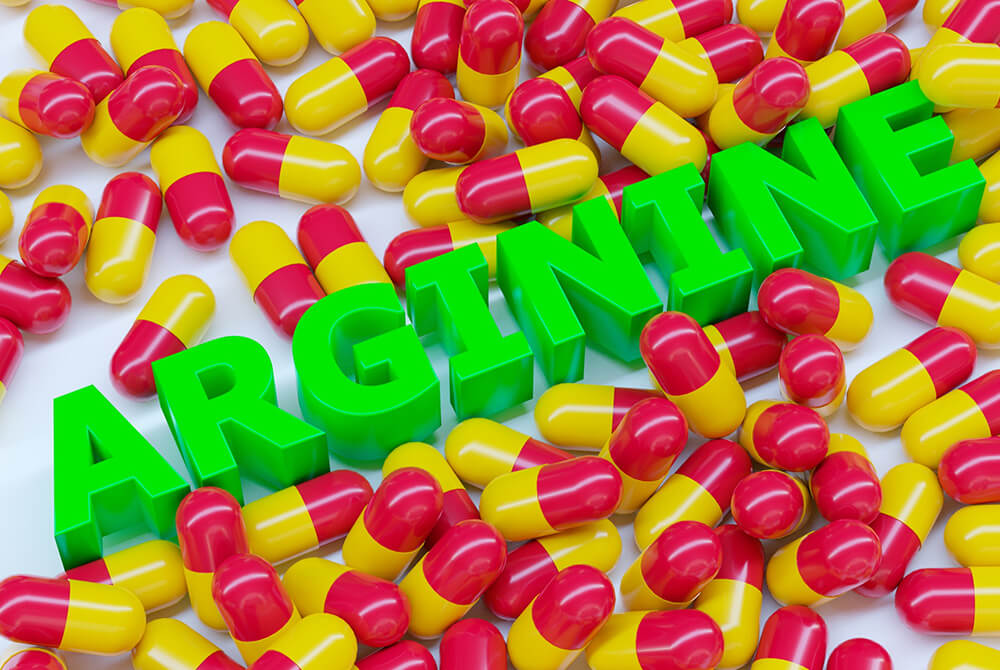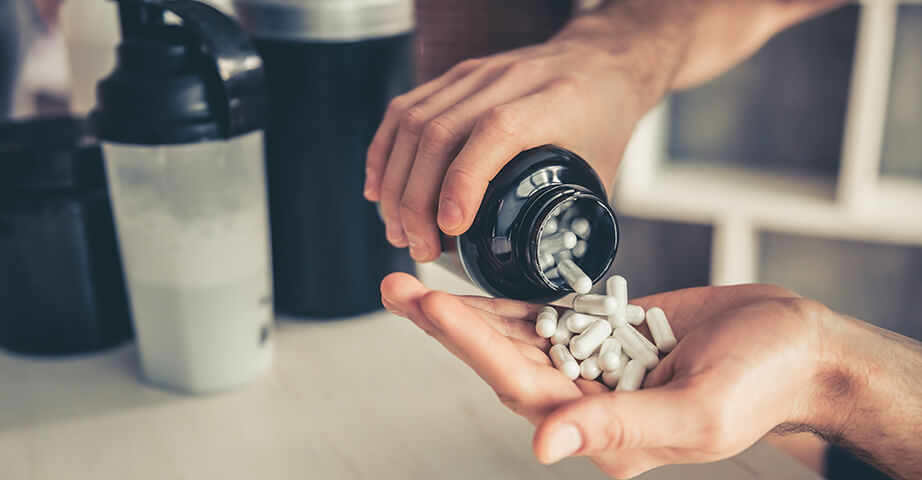Arginine - properties, health-promoting effects and food sources

Arginine is an essential amino acid produced by the body. However, in some physiological conditions, it is necessary to provide it with a diet. A key role for arginine is its involvement in the production of nitric oxide. It allows arginine to support cardiovascular function and physical performance. Where can you find arginine in foods? Who should consider its supplementation? How to dose arginine?
Properties and functions of arginine in the human body
Arginine is one of twenty protein amino acids found in the human body. It is classified as a conditionally essential amino acid, so the body produces arginine in the required quantities if essential amino acids (which the body is unable to produce itself), which are precursors of arginine, are provided with food. Arginine is produced from glutamine, glutamic acid and aspartic acid. For healthy adults, the body's production of arginine is usually sufficient, but children and adolescents, due to the increased demand caused by intensive growth, should supply arginine with food. It is also true for pregnant and breastfeeding women as well as for sick people.
Arginine is also commonly known as L-arginine. L-amino acids are biologically active amino acids that play a role in living organisms. D-amino acids, on the other hand, are biologically inactive. All amino acids found in the human body, including arginine, are L-amino acids.
Arginine functions in the human body:
- is an essential substrate in the synthesis of nitric oxide (II), which causes the widening of blood vessels and reduces the viscosity of vessel walls,
- supports the functioning of mitochondria - cell organelles responsible for energy production,
- prevents hyperammonemia,
- supports the functioning of the immune system,
- participates in communication between body cells,
- increases physical performance,
- improves the functioning of the pituitary gland,
- accelerates wound healing.
Recommended products with arginine
L-arginine - health-promoting effects
When used as a dietary supplement, L-arginine can exhibit positive health-promoting effects. Scientific studies show that:
- L-arginine may increase physical performance.
L-arginine supplements may improve the efficiency of exercise by increasing nitric oxide production in the body, which improves blood flow and muscle oxygenation.
- L-arginine may be helpful in erectile dysfunction.
Daily oral intake of 2.5-5 grams of L-arginine appears to improve sexual function in people with erectile dysfunction. Taking L-arginine with preparations such as sildenafil and tadalafil may work better than taking L-arginine or the preparation alone.
- L-arginine may lower blood pressure.
Taking L-arginine orally may lower blood pressure among healthy people and those with hypertension. It may also be beneficial in pregnancy-induced hypertension. The effect of L-arginine is caused by its involvement in the production of nitric oxide, which is necessary for the relaxation of cells that build blood vessels, as well as the regulation of blood pressure.
- L-arginine can support blood flow when blood vessels are narrowed.
Taking L-arginine orally or intravenously for up to 8 weeks may increase blood flow in people with a narrowed blood vessel that causes poor blood flow to the extremities.
- L-arginine may prevent pre-eclampsia.
Pre-eclampsia is a pregnancy complication characterised by high blood pressure and protein presence in the urine. Taking L-arginine intravenously may lower blood pressure in pregnant women with pre-eclampsia. L-arginine may also reduce the risk of pre-eclampsia in people at high risk of this condition.
- L-arginine may support diabetics
Research shows that L-arginine may benefit people with diabetes by improving glucose metabolism and insulin sensitivity. This is due to L-arginine's action in nitric oxide production. It plays an important role in the body's response to insulin, a hormone that transports sugar from the blood into cells where it is used as energy. Increasing the availability of nitric oxide can help improve the function of insulin-secreting cells.

L-arginine in food
It is estimated that we consume between 4 and 6 g of L-arginine with our meals every day. The typical western diet provides between 25-30% of the L-arginine needed by people. The rest is produced by the body. L-arginine is a protein component, so it is found in protein-containing foods - primarily nuts as well as pulses, meat, and in smaller amounts in fish, milk, dairy products and eggs.
The richest food sources of L-arginine per 100 g of product are:
- Pumpkin seeds - 5.35 g
- Soy protein concentrate - 4.64 g
- Dried spirulina – 4,15 g
- Walnuts – 3,62 g
- Peanuts – 3,35 g
- Sesame – 3,25 g
- Tofu – 3,19 g
- Lean pork – 2,5 g
- Lean beef – 2,5 g
- Almonds – 2,46 g
- Turkey meat – 2,3 g
- Shrimps – 2,25 g
- Chicken meat – 2,17 g
- Veal – 2,05 g
- Oysters – 2 g

Arginine dosage
Arginine can be taken in the form of dietary supplements. Due to the high doses taken each day, it is sold mainly in powder form. It is most easily dissolved in fruit juice, milk or added to a smoothie, e.g. mixed with a protein supplement. Usually, it is used by athletes and people who are dieting. Arginine dosage can vary widely, depending on needs and expectations. Doses given to research participants range from 1.5g to 24g of arginine per day.
People who exercise regularly can take arginine three times a day - in the morning, before and after training. The most commonly recommended dosage is from 2 to 6 g of arginine per serving, while to improve male sexual function, 2.5 to 5g.
